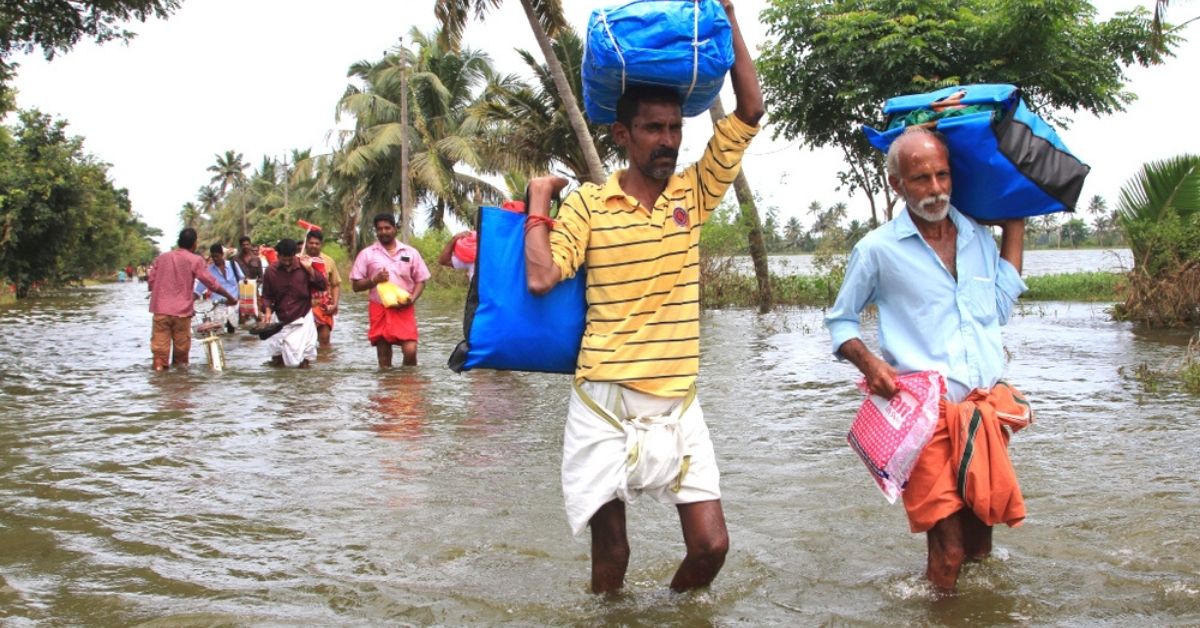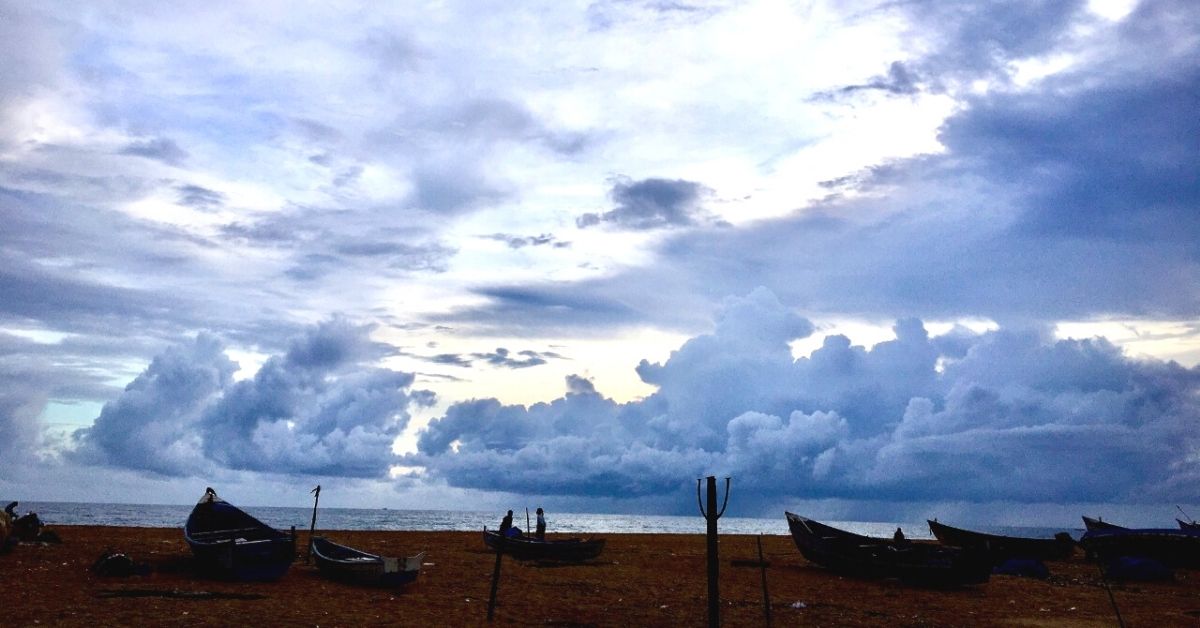5 Researchers Launch Local Radio Station For Fishermen, Save 1000s of Lives
Maxmillan Martin, Aloysius Gomez, Sajan, Sindhu Mariya Napoleon and Kishore Clement started Radio Monsoon to analyse technical data from weather forecasting agencies and help the fishing community receive timely and accurate information

In 2017, Cyclone Ockhi hit India, leaving coastal Tamil Nadu, Kerala and Lakshadweep devastated, before heading towards Gujarat. The cyclone claimed 365 lives and left thousands stranded in what was reportedly the worst weather phenomenon since the super-cyclone of Odisha in 1999.
The event left locals and the fishing community in dire straits, making them realise the importance of accurate and better dissemination of weather information.
“Hundreds of fishermen died and many were probably unaware of the weather warnings or how severe the cyclone would be. The same happened during the Kerala floods in 2018,” says Sindhu Mariya Napoleon, station manager at Radio Monsoon.
She believes that many lives would have been saved if the weather information had reached the fishermen on time.
Sindhu tells The Better India that the information on the weather forecast shared by the India Meteorological Department (IMD) is often technical, posing limitations when sharing it among people at large. Fishermen do not understand English or the technical terms involved in weather forecasts.
To fill the gap, a group of researchers and media experts from Kerala have teamed up to start Radio Monsoon, a community radio dedicated to sharing daily weather forecasts with the fishermen in a language they understand, aiming to save crucial human lives.
Carving a safe passage in the sea

The members of this radio include Maxmillan Martin, a postdoctoral research fellow at the University of Sussex, United Kingdom, founding member Aloysius Gomez, and Sajan, an advisor. Sindhu and Kishore Clement are station managers. The radio station, headquartered in the coastal village of Karumkulam, gathers information from various agencies such as the Indian National Centre for Ocean Information Services (INCOIS), National Centre for Medium-Range Weather Forecasting (NCMRWF), IMD, Indian Institute of Technology (IIT)-Madras and the Kerala Disaster Management Authority (KDMA). Occasionally, it seeks inputs from European Centre.
One of the founding members, who does not wish to be named, says, “Climate change has increased the frequency of cyclones along the western coast of India. Earlier, the cyclones were known to affect more of the east coast, and the trend has changed in recent years.” x
The member says such instances make the fishing community vulnerable to rough weather, and that there is no government agency to help early warning information reach these fishermen directly. “Effective information sharing can help save many lives,” the member adds.
They also say that previous attempts were made to address the issues of fishermen through another community radio in early 2000, but this was futile. However, a new initiative began in 2014, where the Radio Monsoon Trust came into being. The members and volunteers would reach the coast armed with loudspeakers to broadcast weather information. They also took help from the local police station and church to spread information on severe weather conditions. “But we lacked funds and resources,” the member says, adding that Ockhi helped everyone realise the need for such a system more than ever.
In 2018, the University of Sussex, which was already working on an interdisciplinary programme, Forecasting for Fishermen, offered the required resources.
Sindhu, a fisherman’s daughter herself, says that she joined the same year and since then has helped at least 1,000 fishermen with safe weather passages and warnings while they are away from the land.
“We compile data from all the agencies, decipher the technical terms, analyse them, and break the scientific information to the fishermen. For example, a weather warning regarding a depression in the Arabian Sea is announced for a wider geographic area. However, the local impacts are unknown. We identify the meaning of such technicalities and present information that affects the community at the micro-level,” she explains.

She adds that the information broadcasted by government weather forecasting agencies is mainly related to land areas and is less about what effects it will have on the sea. “We analyse that information so that it guides the fishermen in the sea and help change their course or plans accordingly,” Sindhu says.
She further says that the information is shared between 1 pm and 2 pm, when the fishermen are preparing to venture out in the sea. “The information is broadcasted on the radio and posted on social media sites including Instagram, Facebook, WhatsApp and Twitter. The fishermen can also call to seek information for the day. On average, we receive around 350 calls a day. During rough weather conditions, the calls increase to over 500,” Sindhu says.
She says the system works in the manner of a missed call. “A person dials the dedicated phone number, which plays a pre-recorded message. It has been made simpler as many fishermen are not tech-savvy,” Sindhu says, adding that the younger generation of fisherfolk prefers social media.
The team estimates that the number of beneficiaries is multifold as more than one person is listening from a single device at any given time. “The fishermen work in groups, and information is heard by at least three from one radio. So the numbers must be huge,” she adds.
Kishore says the claims are made based on responses they have received from the ground and the sea. “The range of the community radio is limited to 10-12 km on land. However, with fewer interferences and disturbances in the sea, the signals can reach over 70 km and help the fishermen in a wider area,” he says.
Fishermen as secondary data sources
J Alphonse, a fisherman of a country boat from Puthiyathura, a coastal village in Thiruvananthapuram, says, “Since Ockhi, all the fishermen have been scared of the rough weather conditions. Hence, getting timely and accurate weather updates has become more important than ever.”

He says that Radio Monsoon has given the fishing community access to scientific information in Malayalam, their regional language. “We know how the wind direction will be and what weather patterns to expect once in the sea. The data from official forecasting agencies never reach us, and it has not changed even after Ockhi. The only source of information to rely on are the narratives from mainstream media,” Alphonse says.
Kishore says that fishermen from northernmost Kollam and southernmost Kanyakumari have also demanded the services. “The fishermen have no state boundaries in the sea, and they tend to cross paths and areas. The fishermen from neighbouring coasts have learned about the radio, seen its benefits, and now seek its services. They access the information once they are within the range,” he adds.
He says that Radio Monsoon also takes inputs from fishermen. “The fishermen are present in the sea and witness weather changes first hand. They are indigenous and have traditional knowledge of the sea. Their information acts as secondary data to cross-verify or adds valuable gaps missed by the technology,” Kishore adds.
Kishore says they are now working on making Radio Monsoon self-sustained. “Operating a community radio requires heavy resources and an intelligent workforce that understands scientific data and can deliver it to the advantages of the listeners,” he adds.
But for now, until the revenue model streamlines, the team says their entire focus is on helping fishermen brace for rough weather, protect them and reduce loss of life through timely and accurate information.
To listen to and connect with Radio Monsoon, click here.
Edited by Divya Sethu
If you found our stories insightful, informative, or even just enjoyable, we invite you to consider making a voluntary payment to support the work we do at The Better India. Your contribution helps us continue producing quality content that educates, inspires, and drives positive change.
Choose one of the payment options below for your contribution-
By paying for the stories you value, you directly contribute to sustaining our efforts focused on making a difference in the world. Together, let’s ensure that impactful stories continue to be told and shared, enriching lives and communities alike.
Thank you for your support. Here are some frequently asked questions you might find helpful to know why you are contributing?


This story made me
-
97
-
121
-
89
-
167











